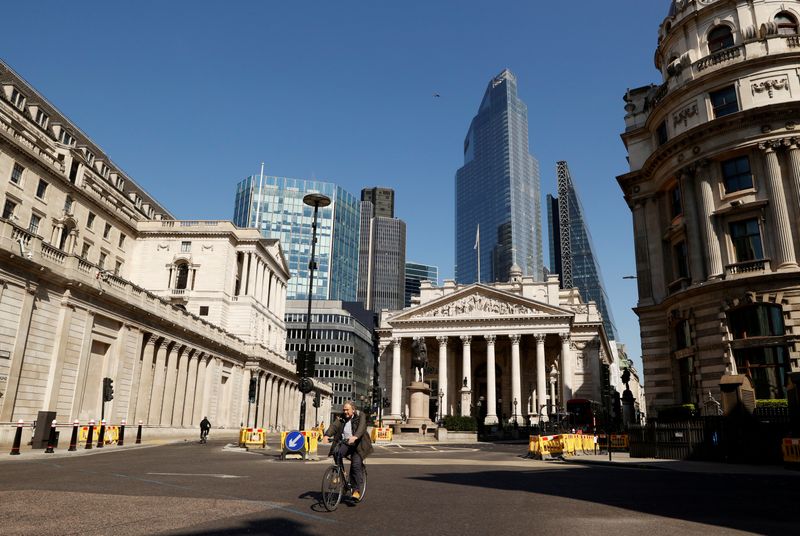LONDON (Reuters) – Money markets ramped up expectations that the United Kingdom could cut interest rates below zero for the first time as policymakers debated further steps to support the struggling economy, dragging the pound to a more than three-week low.
Interest rate futures contracts from December 2020 dipped into negative territory <BOEWATCH> on Monday as traders raised bets that the Bank of England would take benchmark interest rates below zero in the coming months.
Unlike the United States where Federal Reserve officials have portrayed a more unified stance in dismissing negative interest rate talk, comments by Andy Haldane, the BoE’s chief economist, over the weekend fuelled speculation that British officials are not averse to going down that path.
“While we don’t think that negative interest rates are a near-term possibility as the central bank has a few more bullets left, Haldane’s comments opens the door to that possibility,” said Lee Hardman, an FX strategist at MUFG in London.
The central bank is looking more urgently at options such as negative rates and buying riskier assets to prop up the country’s economy as it slides into a deep coronavirus-driven slump, Haldane was quoted as saying in the Telegraph newspaper over the weekend.
Later on Monday, rate-setter Silvana Tenreyro talked up the benefits of negative rates, citing the experience of other countries in Europe.
“My personal view, which comes from the reading of the European experiences, is that negative rates have had a positive effect in the sense of having a fairly powerful transmission to real activity,” she told a London School of Economics webinar.
Top BoE officials have previously expressed objections to taking rates below zero – as the central banks of the euro zone and Japan have done – because it might hinder the ability of banks in Britain to lend and hurt rather than help the economy.
But with the BoE’s benchmark at an all-time low of 0.1% and Britain facing potentially its sharpest economic downturn in 300 years, talk of cutting rates to below zero has resurfaced.
PLAUSIBLE
Despite opposition from U.S. Federal Reserve officials to cutting policy rates below zero, Richard McGuire, head of rates at Rabobank, said negative rates are plausible on both sides of the Atlantic as, “exploding debt stocks will only be manageable through constrained borrowing costs.”
Futures contracts from December 2020 have dipped into negative territory while contracts maturing in June 2021 are pricing in as much as minus 0.03% in benchmark policy rates.
Short-end British bond yields also fell.
Two-year government bond yields <GB2YT=RR>, often viewed as an indicator of where official rates are headed, fell back into negative territory and is within striking distance of a record low of minus 0.05% hit last week.
Talk of negative interest rates has steadily pushed shorter-dated bond yields lower as markets have noted the central bank is nearing the limits of the amounts of government bonds it can keep purchasing without damaging markets.
Although the BoE has a self-imposed issue limit of 70%, and chooses not to buy gilts with a maturity of less than three years, HSBC strategists say the proportion of the free float that can be bought is substantially lower than 70%, especially in the longer end of the curve.
Those limits could push the central bank to remove its self-imposed restrictions on purchasing debt for sub 3-year maturities, target the shape of the yield curve or ultimately, implement negative interest rates.
The possibility of negative interest rates would also hurt the pound more at a time when the stalemate between Britain and the EU on Brexit talks is keeping investor sentiment downbeat.
The latest round of Brexit negotiations has raised the prospect that there will be no deal struck on Britain’s formal departure from the bloc after the end of the current transition period at the end of this year.
(Reporting by Saikat Chatterjee and Dhara Ranasinghe; Editing by Simon Jessop and Toby Chopra)

















